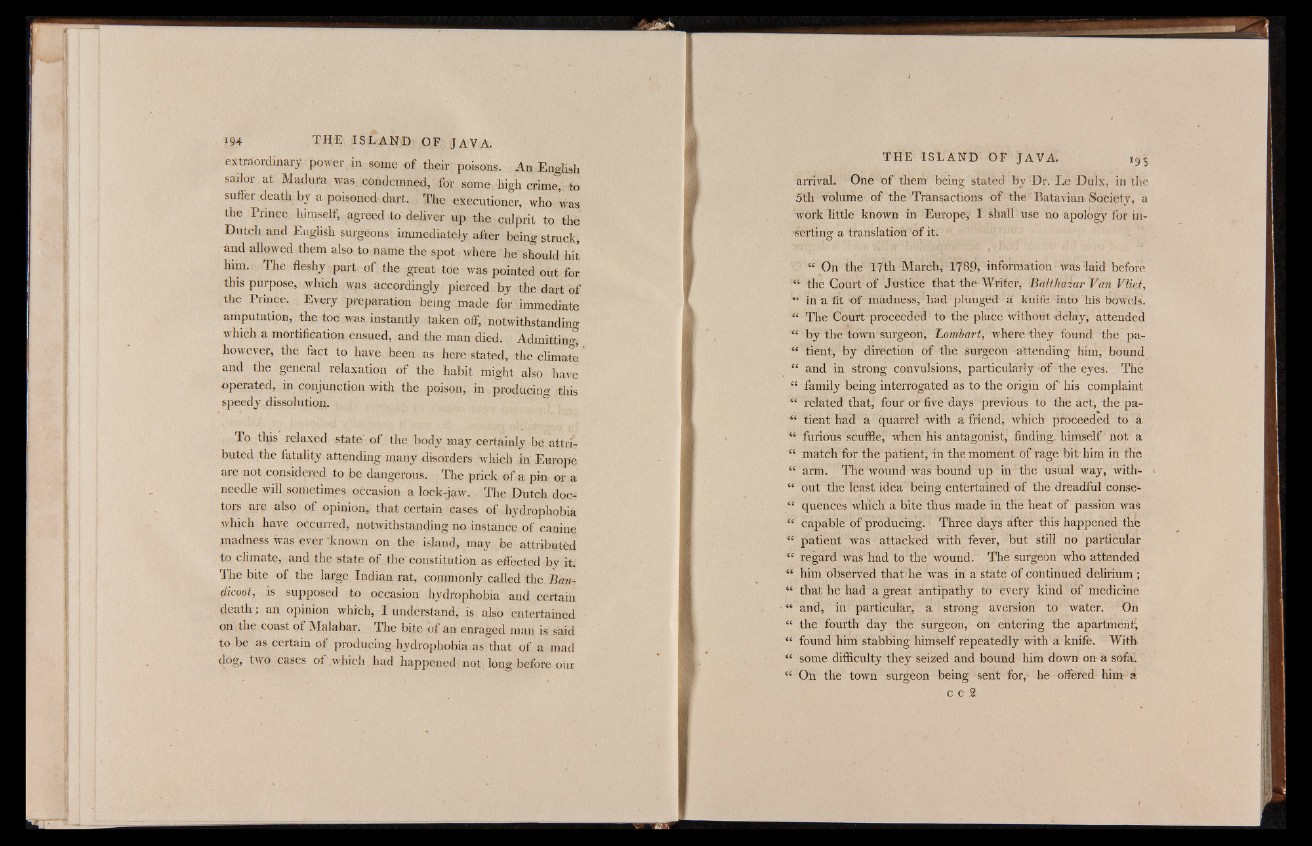
extraordinary power in some of their poisons. An English
sailor at Madura was condemned, for some high crime, to
suffer death by a poisoned dart. The executioner, who was
the Prince himself, agreed to deliver up the culprit to the
Dutch and English surgeons' immediately after being struck,
and allowed them also to name the spot where he should hit
him. The fleshy part of the great toe was pointed out for
this purpose, which was accordingly pierced by the dart of
the Prince. Every preparation being made for immediate
amputation, the toe was instantly taken off, notwithstanding
which a mortification ensued, and the man died. Admitting,
however, the fact to have been as here stated, the climate
and the general relaxation of the habit might also have
operated, in conjunction with the poison, in producing this
speedy dissolution.
To this relaxed state' of the body may certainly be attributed
the fatality attending many disorders which in Europe
are not considered to be dangerous. The prick of a pin or a
needle will sometimes occasion a lock-jaw. The Dutch doctors
are also of opinion, that certain Cases of hydrophobia
which have occurred, notwithstanding no instance of canine
madness was ever known on the island, may be attributed
to climate, and the state of the constitution as effected by it.
The bite of the large Indian rat, commonly called the Bandicoot,
is supposed to occasion hydrophobia and certain
d e a th ; an opinion which, I understand, is also entertained
on the coast of Malabar. The bite of an enraged man is said
to be as certain of producing hydrophobia as that of a mad
dog, two cases of .which had happened not long before our
arrival. One of them being stated by Dr. Le Dulx, in the
5th volume of the Transactions of the Batavian Society, a
work little known in Europe,' I shall use no apology for in-
serting a translation of it.
“ On the 17th March, 1789, information was laid before
“ the Court of Justice that the Writer, Balthaiar Van Vliet,
“ in a fit of madness; had plungëd a knife into his bowels.
“ The Court proceeded to the place without delay, attended
“ by the town surgeon, Lombart, where -they found the pa-
“ tient, by direction of the surgeon attending him, bound
“ and in strong convulsions, particularly of the eyes. The
“ family being interrogated as to the origin of his complaint
“ related that, four or five days previous to the act, the pa-
“ tient had a qüarrel with a friend, which proceeded to a
“ furious scuffle, when his antagonist, finding, himself not a
“ match for the patient, in the moment of rage bit him in the
, arm. The wound was bound up in the usual way, with-
“ out the least idea being entertained of the dreadful conse-
“ quences which a bite thus made in the heat of passion was
“ capable of producing. Three days after this happened the
“ patient was attacked with fever, but still no particular
“ regard was had to the wound. The surgeon who attended
“ him observed that he was in a state of continued delirium ;
“ that he had a great antipathy to every kind of medicine
“ and, in particular, a strong aversion to water. On
“ the fourth day the surgeon, on entering the apartmént,
“ found him stabbing himself repeatedly with a knife. With
“ some difficulty they seized and bound him down on- a sofa.
“ Oh the town surgeon being sent for, he offered him a
c c 2